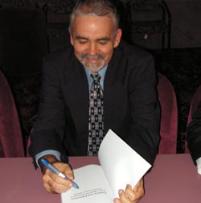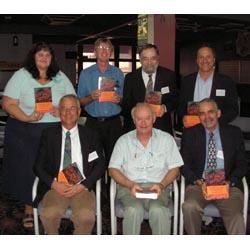Public is duped into consenting, say leading journos and academics
Published on 15 June, 2005
Some of Australia’s leading journalists and academics have joined forces to help ordinary people gain input into decisions affecting their future.
Their new book aims to make people aware that society’s dominant systems are manufacturing their consent, rather than seeking their consensus.
It offers an alternative framework of analysis and understanding to ‘open windows’ so marginalised and disenfranchised members of the public can assert more meaningful control over the political and corporate decision processes.
 Well-known contributors to the API Network publication include Paul Kelly, Catharine Lumby, Donald Horne and Rosemary Sorensen. The book is edited by Denis Cryle (CQU) and Jean Hillier. Other CQU contributors include Kerrie Hand, Errol Vieth, Robert O\\\'Sullivan, and Geoff Danaher.
Well-known contributors to the API Network publication include Paul Kelly, Catharine Lumby, Donald Horne and Rosemary Sorensen. The book is edited by Denis Cryle (CQU) and Jean Hillier. Other CQU contributors include Kerrie Hand, Errol Vieth, Robert O\\\'Sullivan, and Geoff Danaher.
The book was launched at CQU Rockhampton on Tuesday.
‘Consent and Consensus – Politics, Media and Governance in Twentieth Century Australia’ claims that we live in an age of entertainment culture and talk-back populism.
The ‘dissenting intelligentsia’ are sidelined and ordinary members of the public are valued as decision consenters – not as decision participants.
The collection of chapters includes an historical overview showing how Australia gained its class-based communication legacy which emphasised order and security before liberty. It was concerned with management rather than enlightenment.
As early as the Boer war, the new technology of cable was decisive in shaping public opinion in favour of the war and the necessity of helping Britain.
An array of sporting codes was also used early on to reinforce national identity in between wars.
Meanwhile, recycling of negative media images of marginalised groups (for example bikers) helps to sustain a negative consensus about ‘otherness’.
Outrage radio and shock-jockery may seem democratic but instead rely on a vocal audience consuming their own stereotyped prejudices.
The editorial independence of the media has been circumvented by commercial and managerial imperatives and politics is blended with entertainment to dumb-down the issues. Meanwhile, the survival of quality newspapers is under threat from the tabloids.
The book includes contributions about the importance of fostering dissent. There is a challenge to the notion that a political mandate covers all decisions made by a governing group. There are calls for changes to foster decision-making involving consensus, group learning and mutual problem solving.
 The book uses the concept of ‘growth coalitions’ to show how seemingly diverse interests have economic and political links which coalesce in consensus around the potential for growth in land development.
The book uses the concept of ‘growth coalitions’ to show how seemingly diverse interests have economic and political links which coalesce in consensus around the potential for growth in land development.
The book provides an example of how subtle dissent in local plan-making can work and reviews the importance of procedural justice and fairness in generating community consensus decision making.
Other chapters show how agencies of governance, the state and big business use the media to engineer consent and consensus for their policies, decisions and actions. They show how ordinary people can become ‘duped consenters’ unless they have the knowledge and opportunity to resist.
Photo above: (Back L to R) Kerrie Hand, Geoff Danaher, Robert O'Sullivan, Assoc Prof Kevin Tickle; (Front L to R) Dr Errol Vieth, Prof John Rickard, Dennis Cryle.
Photo left: Denis Cryle signs one of the copies at the launch.

